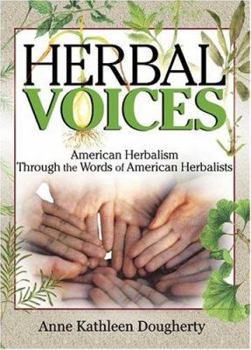Herbal Voices: American Herbalism Through the Words of American Herbalists
Learn how traditional herbal practitioners are responding to the sudden, massive popularity of herbal medicine!
Format:Hardcover
Language:English
ISBN:0789022036
ISBN13:9780789022035
Release Date:December 2004
Publisher:Routledge
Length:396 Pages
Weight:1.69 lbs.
Dimensions:1.2" x 6.4" x 8.9"
Customer Reviews
1 rating
Excellent book....great resource....
Published by Thriftbooks.com User , 19 years ago
HERBAL VOICES, by Kathleen Dougherty is the book to read if you are looking for a way to familiarize yourself with herbalists as well as their practices and history. Dougherty interviewed dozens of American herbalists, asking them salient questions such as "How did you become a herbalist?, What is the nature of your remedies?", and "How do you think science enters into the equation?" The first 100 pages of this book form a summary of her findings and conclusions, and the remainder is a distillation of 20 selected interviews. I found Dougherty's book enlightening because it discusses the role of science (experimental) in conjunction with the traditional use of herbs for healing and/or preserving health (experiential). Holistic herbalists deal with areas science cannot address because science is linear and never proves anything. Science can only suggest with a certain degree of confidence that such and such is "likely" to be connected or that selected events are correlated - and do this only if the thing being observed or studied can be subjected to a clinical trial or something equivalent. Holistic practitioners, on the other hand, do not view the Body-Mind-Spirit as three distinct entities that can be analyzed separately. They also generally follow the guidance of a particular tradition handed down from `wise elders' who preserved the cumulative wisdom of the ages. Along with what to obtain and how to use it, these wise elders have passed along shamanistic rituals that work with the whole person. The Holistic herbalist considers the role of the individual human spirit in health. Holistic practitioners also practice a "hands on" approach, that involves touching in the form of massage or healing hands. Furthermore, herbalists generally do not use their herbal products like medicine dispensed at a pharmacy. For example, if you take Echinacea to do it in the most effective way you must take it in a certain manner, which does not necessarily mean popping denatured tablets purchased at a Natural Food Store in your mouth every day. The naturalistic viewpoint suggests that whole herbs you grew and processed yourself with love are the best way to go, and these products must be handled with care. Growing your own herbs and learning to make tinctures, salves and other products is the best way of all - and don't forget to give thanks to the Source. This is an excellent, well written book and a must for anyone who seeks to understand these healers and their practices.





